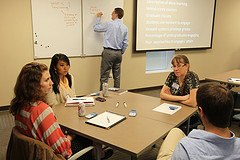I’ve learned English as a foreign language. I only travelled abroad to put my English to the test after I’d been teaching it – also as a foreign language – for quite a few years. The large majority of my English teachers were also ‘non-native speakers’ (and I use the inverted commas for the same reason Holliday does) and, to be very honest, this has never been an issue to me nor to the people who were learning the language in my classroom or language institute. If anything, I’m thankful to each and everyone of them, who have inspired me to be the teacher I am today. I’ve never thought any less of them based on their nationality – I’ve always seen them for what they were as professionals: teachers – period.

Photo by João Silas on Unsplash
Bear in mind that this was quite a while ago, and having the chance to listen to ‘native speakers’ was only possible through films and songs on the radio. There was no Internet to help us out – and even buying books in English was quite expensive. This means that listening to a ‘native speaker’ was quite rare, and still, as a student, neither I nor my parents back then felt that I should be learning from someone whose English was their native language. Please, allow me to add that my parents were foreigners themselves.
The label is highly disquieting, but has to be used in order to seek to undo it. Cumbersome though it may be, I therefore continue to place ‘native speaker’ and ‘non-native speaker’ in inverted commas both to signal ‘so-called’ and to indicate a burden that has to be endured until the issue can be undone.
Holliday, A., in Native-speakerism: Taking the Concept Forward and Achieving Cultural Belief
It was only when I started teaching English that I was introduced to the concept of native speakerism, which is defined by Holliday as “a pervasive ideology within ELT, characterized by the belief that ‘native-speaker’ teachers represent a ‘Western culture’ from which spring the ideals both of the English language and of English language teaching methodology”. The first thing that comes to mind is the use of the -ism suffix, in itself a derogatory. It virtually puts the idea of native speakerism on the same level as other -isms we still see as pervasive in 2017: racism, sexism, chauvinism, and what not. This makes it so heavy that it cannot be taken just as something that should be dismissed out of hand.
Yet, there’s something discomforting in the mere idea of the superiority of the native speaker when it comes to teaching a foreign language that goes way beyond the usage of the term in itself. It is something that makes me wonder about the widespread use of the term and the binary view that this sort of debate usually brings about. It’s as if there’s no room for further discussion on a matter that should be discussed and better understood. If we talk openly about it and understand its roots, it might be easier to find a way to show people just how wrong they have been. It’s 2017 and we still see cases of racism taking place almost on a daily basis – an issue that has been thoroughly discussed. But some people just fail to see other people as individuals that ought to be respected for who they are and the way they are – these people still classify other people as, well, others. When there’s a distinction between ourselves and the others, the cultural bias will be there for years (decades?) to come and nothing will change. Discussions on any topic should never begin with an attack to the person – this is the way to ensure that you won’t have a fruitful discussion at all. So where should we begin?
English Teachers
As I said before, I’d never even considered thinking less of teachers of English from this or that nationality until I became a teacher myself and heard such prejudice from some of my colleagues. In all honesty, that never made me question the competence of my teachers, but it somehow made me question my own competence to teach the language. One thing that I noticed quickly, though, was how much the very same teachers who complained about such a distinction (prejudice?) valued ‘native speakers’ themselves when they were to spend their hard earned money on their professional development. As Thornbury wrote:
Ironically, it is typically native-speakers who are the ones doing the hand-wringing: there is a dominant discourse trope in a lot of current ‘critical’ theory that consists of native-speaker academics condemning the pervasiveness of native-speakerism, while urging those who are oppressed by it to fling it off and assert their own legitimate identities as users, and hence owners, of global English. It’s as if the poison and the antidote are being administered by the same hand).
Thornbury, S., in N is for Native Speakerism
I must say that I know quite a few ‘native speakers’ who heavily oppose to the idea that the mere fact that your passport is enough to grant you your teaching qualification. They tend to value ‘non-native speakers’ when they attend conferences in countries where English is taught as a foreign language much more enthusiastically than those teachers from that very same country. I myself have already overheard a conversation in a conference I was speaking that was exactly like this:
Teacher A: So, which workshop are you going to attend now?
Teacher B: Oh, I’m going to see this gringo‘s talk – Henrick Oprea. It’s better than attending a session presented by a Brazilian, I suppose.
That interaction illustrates that, unfortunately, the idea of native speakerism is spread exactly by some of those who are on the receiving end of the prejudice and should be the ones fighting it.
Have we, teachers of English as a foreign language who happen not to have been born in an English speaking world, got so little self-esteem? Could it also be a matter of taking our peers for granted in a way that we believe they can’t add anything to our practice, which is why we have a natural inclination to praise the foreigner? Whatever it is, it seems to me that even though we have to discuss the matter a lot further, more often than not we fall prey to the trap of the us versus them argument, which does more harm than good to finding a solution to this whole debate.
In addition to the world of conferences, we still see many ‘non-native speakers’ criticising their peers on their command of the language, their accent, and limited vocabulary. These are not learners, but teachers who say it openly (except to the person they’re talking about) to anyone who might want to hear it. This, obviously, resonates with students, which takes me to the second point.
The clientele
“Repeat a lie often enough and it becomes the truth.” This is a law of propaganda, but it seems to have perpetrated our world of language teaching and learning. It is not uncommon, nowadays, for one to hear things such as, “you can only learn a foreign language if you travel to a country where the language is spoken,” and “find yourself a native speaker to teach you as they know the nuances of the language in a way that no non-native could ever grasp.” The thing here is that students have been told these things by so many people now that they merely reproduce these words and end up believing them. This has also got to do with the fact that we are all experts in finding something to put the blame on instead of acknowledging we haven’t done our share.
We all know that learning a foreign language is nothing to be made light of. Learning involves effort, and not all students are willing to go the extra mile to actually learn a foreign language. Instead of conceding that they’ve been failing to do what it takes to learn, it’s easier (and part of our self-protection instinct) to give in to what people who might not have a clue of what they’re saying and repeating it to themselves: “I can’t learn English in Brazil/Russia/Japan because it is only possible for anyone to learn a language if one lives for a while in a country where that language is spoken” and “I need to find myself a native speaker to teach me.”
This doesn’t happen only in the world of ELT – we’re not that special. This is how the human brain functions. The issue here is that we (‘non-native speakers’) do let these things happen by putting ourselves in a position of inferiority and allowing our students to see it. Some teachers, despite their training and education, believe that the only reason why they can teach the language is because they’ve spent some time abroad to truly learn it.
In a country where language teaching is not seen as education, business people look at ELT as any other business, and they’re in it for the profit. If their target audience believes that learning from ‘native speakers’ is best, they’ll da whatever they need to do to give their clients what they want. If students praise ‘native speakers’ as teachers, this is what business owners will go after. More often than not, owners aren’t educators like teachers. Many of them couldn’t care less about training or education – they’re interested in attracting students, making a profit no matter what, and that’s it.
Isn’t it time we started reaching out to students, then, instead of criticising school owners for doing what they are in the business for? Wouldn’t this allow students to see that they’ve been led to believe in myths and, consequently, help them make better choices when it comes to learning English?
The Approaches and Methods
When we consider the approaches and methods for teaching English to students of other languages, we can’t help but notice that we’ve got a whole bunch of ideas and practices that have been developed for an ESL (English as a Second Language) environment simply imported to an EFL (English as a Foreign Language) environment. This has a huge impact in the way that we teach. For instance, up till recently, L1 was considered taboo in an EFL setting. Why? Because according to the principles of CLT (among others), one needs to learn a language by being spoken to and only using the target language. This makes perfect sense in a multi-lingual learning environment where it’s virtually impossible to require that an English teacher speak all the different languages their learners speak.
The fact that this has been transferred to an EFL setting, where classes tend to be for students who share the same L1, has also helped spreading the concept that EFL classes only work if no L1 is ever used. Let’s face it, such a view of language teaching certainly is beneficial to those who are proficient in the target language and contribute to spread the belief that one’s command of the language is the only indicator of success in teaching that language. Although I strongly believe that English teachers should constantly work on their language, this doesn’t mean that it is the only (not even the best) indicator of successful teaching.
We can go back to the part of the English teachers and add that it is extremely hard for a ‘non-native speaker’ to have their peers listening to their way of teaching, or to write an sell a book on methodology, for instance. English teachers still resort (almost exclusively) to books written by ‘native speakers’ to base and justify their practices. How can we expect to change the game when we deem our very own non-native speakers SLA researchers less important (or even less knowledgeable) than those from abroad? Isn’t it time we also did something about this as well?
Conclusion
We can’t substitute one kind of prejudice for another. Instead, we ought to shed some light on the matter of native speakerism and help people see this from the perspective that truly should matter: if you want to be a teacher, you should learn how to teach. It all comes down to this, after all. Your nationality shouldn’t matter at all. ‘Native speakers’ can be outstanding teachers, and so can ‘non-native speakers’. At the end of the day, it is how much you’ve helped your learners that matters. A lot has already been written about the benefits and the drawbacks that each one of them bring to the table. However, how does ELT benefit from trying to find a winner in this discussion? ‘Non-native speakers’ sometimes brag about the fact that linguists have already stated that ‘non-native speakers’ are better teachers in a world where English has become a global language in which non-native speakers far outnumber native speakers. How helpful is that, honestly? Where do we draw the line there?
To my mind, the discussion is only valid on account of the prejudice it entails. Just like any kind of prejudice, we ought to discuss this matter once it’s been brought to our attention. However, if you ask me, the world would be a much nicer place to live in if we just understood that a teacher is a teacher and that’s that. There’s no such thing as where you’re from defining whether or not you should get the job. If you’re a teacher, and if you have the necessary qualifications, that’s what counts towards hiring, for instance. But I’m not that naïve, obviously. If we still see cases of racism, sexism, prejudice against LGBTQ+, prejudice against women in the world, it’s not just by saying that this shouldn’t happen that it will cease – I wish words had that power. In the meantime, we could benefit from it if we also avoided fighting prejudice with hatred. A teacher is a teacher. That’s how it should be. And notice I haven’t even said that an English teacher is an English teacher – but that’s something for another post.
Phew! Quite a long post and against all the best practices of blogging, but it hardly barely scratches the surface of such a complex topic. If you’ve made it to the end, add your comment so that we can think further about the topic.




 A happy belated teachers’ day to each and every one reader of this blog. This humble teacher/blogger hopes that one day we, teachers, are valued by all wonderful and crazy things that we do. 🙂
A happy belated teachers’ day to each and every one reader of this blog. This humble teacher/blogger hopes that one day we, teachers, are valued by all wonderful and crazy things that we do. 🙂









